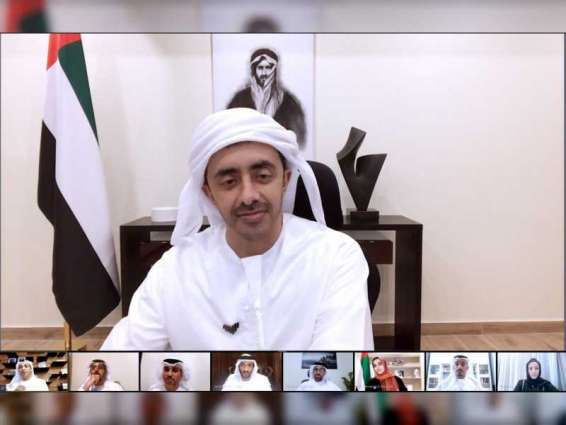ABU DHABI, (Pakistan Point News - 29th Jul, 2020) H.H. Sheikh Abdullah bin Zayed Al Nahyan, Minister of Foreign Affairs and International Cooperation and President of the Education and Human Resources Council, chaired two remote meetings of the council held via video conferencing.
During the meetings, Hussain bin Ibrahim Al Hammadi, Minister of Education, presented the precautionary protocols and procedures adopted by all educational institutions around the country to create a safe and healthy environment during the coronavirus, COVID-19, pandemic while stressing the importance of committing to the document on educational institutions operation in the UAE, which was drafted by the ministry.
The Council was also briefed about a research study on the economic impact of remote education in the UAE, presented by the Ministry of Education, which addressed various scenarios for managing human resources of the country’s education sector, which is valued at around AED33 billion. The sector’s human resources account for up to 12 percent of its productivity.
The ministry also presented a range of summer programmes, skills and academic activities to be launched remotely in 2020, in cooperation with the Ministry of Culture and Youth, which implements various training programmes targeting over 137,000 students and parents.
The ministry then pointed out that over 98 programmes were launched in cooperation and with the participation of over 55 public and private entities from around the country.
Jameela Al Muheiri, Minister of State for Public Education, presented the outcomes of an assessment of the remote learning system adopted by public and private schools based on three key pillars, which are focussing on the education and learning processes, providing students with positive education, and the role of school administrations in managing education processes and sources.
She also pointed out that the assessment classified schools under three categories, which are advanced, partially-advanced and non-advanced, noting that 22 percent of public schools and 67 percent of private schools were classified as advanced, 78 percent of public schools and 32 percent of private schools were classified as partially advanced, and 12 private schools were classified as non-advanced.
Noura bint Mohammed Al Kaabi, Minister of Culture and Youth, presented the details of a national programme to support talents affected by the COVID-19 crisis, noting that its first phase provided financial grants averaging between AED15,000 to AED50,000 to 87 independent talents and small and medium-sized enterprises, SME.
She also addressed some of the challenges faced by the sector’s employees and institutions, as well as the policies and legislation being drafted by the ministry to establish an effective regulatory environment that attracts talents and motivates them to invest in cultural and creative industries.
She then highlighted the importance of making culture an economic tool that creates job opportunities, offers professional alternatives, and makes cultural and creative industries part of the national economy.
Shamma bint Suhail Faris Al Mazrui, Minister of State for Youth Affairs, presented the details of a national summer youth programmes offered to the entire community as part of a comprehensive joint system under a single strategy, noting that her ministry will cooperate with leading international partners to ensure the success of the programmes.




